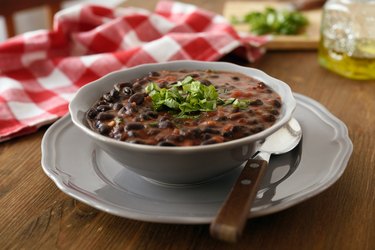
Glutamine, also known as L-glutamine, is an amino acid — an essential building block of protein — per a November 2018 study in Nutrients. Typically, your body produces enough to support a functioning immune and digestive system.
But when there is a severe illness, injury or other conditions leading to less stored glutamine, you might need to add more glutamine to your diet, per the U.S. National Library of Medicine. Glutamine is found in many plant and animal foods.
Video of the Day
Video of the Day
Vegan Sources of Glutamine
Raw, leafy vegetables have high levels of glutamine. Heat destroys glutamine, so it's best to eat your veggies raw when possible, according to a February 2018 article in the journal BMC Biophysics.
Some of the most common vegan food sources of glutamine are:
- Spinach
- Cabbage
- Parsley
- Beets
Juicing is a good way to get glutamine from vegetables. The concentrated juices of raw spinach, parsley, cabbage or beets can be taken as a 1- or 2-ounce shot. A more palatable beverage can be made by diluting those juices with pure water or with apple, carrot or celery juice.
Raw spinach and parsley or shredded raw beets and cabbage can be used as glutamine-rich additions to salads or side dishes. Fermented vegetable dishes such sauerkraut or kimchi supply glutamine in a highly absorbable form.
Legumes are also high in glutamine, and they can add much-needed protein to a vegetarian diet. These foods should be cooked:
- Beans, such as black beans or kidney beans
- Peas
- Lentils
Many whole grains are rich in glutamine. These include:
- Oats
- Wheat germ
- Products made from whole wheat
- Quinoa
- Millet
- Brown rice
Despite being high in fat, nuts, seeds and their butters — particularly those that are higher in protein — have significant amounts of glutamine. Add in foods like:
- Almonds
- Pistachios
- Walnuts
- Pumpkin seeds
- Sunflower seeds
- Peanuts
- Peanut butter
Animal Foods High in Glutamine
Animal proteins are also among the glutamine-rich foods.
Cooking these foods, which is necessary to prevent foodborne illness, destroys much of the availability of the amino acid, but you can still get glutamine by including cooked meats and safely prepared sushi and sashimi into your diet. Try eating more:
- Beef
- Poultry
- Pork
- Fish
- Eggs
- Organ meats
Eggs and dairy products are food sources of glutamine that are great for people who avoid meat. Whey protein, a byproduct of cheese production that's used as a nutritional supplement, is a top source of glutamine.
While milk and yogurt are good sources of glutamine, cheese is generally a better source. Specifically, aim to eat more:
- Cottage cheese
- Ricotta
- Parmesan
- Mozzarella
- Cheddar
Like other animal sources, milk, yogurt and cheeses that are lower in fat typically supply more protein and glutamine per ounce than high-fat dairy products do, per the USDA.
Glutamine Supplements
Glutamine is available in a supplement form but its efficacy hasn't been proven, according to the Nutrients study.
Do not take glutamine supplements without talking to your doctor or dietitian first.
Glutamine Benefits
Glutamine is the most abundant amino acid found in your body, according to the Nutrients study. Because your body can make its own glutamine, it's considered a non-essential amino acid.
Research shows that glutamine is linked to helping:
- Support your immune system, according to the study in Nutrients.
- Aid in tissue repair, according to the study in Nutrients.
- Support healthy brain function, according to an October 2011 article in Neuron Glia Biology.
- Aid digestion, according to a May 2017 article in the International Journal of Molecular Sciences.
- Remove ammonia, a waste product, from your body, according to a July 2010 article in Biochemical Pharmacology.
There's no precise dosage of glutamine. It's hard to overdose on glutamine from dietary sources, which is why food sources are preferred as a way to get more glutamine.
Tip
Always discuss major changes in your diet with your doctor if you're on particular medications, such as blood thinners. Some of the foods high in glutamine also have high levels of vitamin K, which can compromise the effectiveness of warfarin as well as some other anti-clotting medications.
- University of Maryland Medical Center: Glutamine
- Impact of Glutamine-Rich Foods on Immune Function: Gina L. Nick,PhD, ND
- The Ultimate Nutrient, Glutamine; Judy Shabert
- Swanson Health Center: The Benefits of Raw and Fermented Goat's Milk and Cow’s Milk
- Today's Dietitian: Glutamine Supplementation — Evidence Indicates It May Benefit Patients With Critical Illness